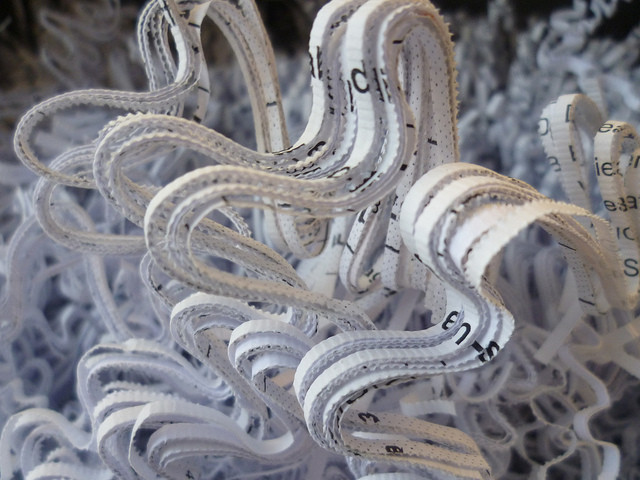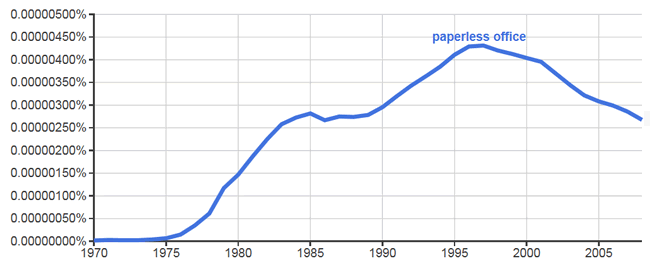
Photo credit: Rosmarie Veogtli on Flickr | Creative Commons
Everyone knows there’s too much paper in offices; everyone knows it’s bad for the environment. And most tech writers know that, even if we’re not the main culprit, we’re certainly what pop psychologists call “enablers.” Granted, no one’s ever seen a paperless office, but people have been talking about them for decades. According to Google’s Ngram Viewer, here’s what happened to the term “paperless office” between 1970 and 2008:

Based on that curve, this earnest but foolish concept was born with the microcomputer, got a second wind with Windows and the Web, and began its decline while we were all still obsessed with the coming Y2K apocalypse (another earnest but foolish concept). By the time Sellen and Harper’s book, The Myth of the Paperless Office, came out in 2002, the myth was already losing air like Macy’s Underdog blimp on Black Friday.
I won’t reiterate Sellen and Harper’s entire thesis, but the upshot is that people don’t cling to paper merely because of habit, tradition, or static electricity. Sellen and Harper argue that the human eye, brain, and hand interact with paper in ways that no technology has been able to satisfactorily replace. And to be honest, they don’t offer a lot of hope that we will be done with office paper within our lifetimes.
This would be just about the right time for the Cavalry of Hope to come charging over the hill. Instead, I’d like to offer three more dollops of hopelessness.
1. All Software is bad.
(I’ve referred to this elsewhere as “Goldstein’s Law,” and who knows it better than technical writers do?) We all hope there will soon be a flat, flexible, 8.5×11-inch screen that doesn’t cost an arm and a leg. And even before we have it, you can easily imagine how you’d like its interface to work. But the developers will make the software work the way they think it should instead of the way you intended, and the project managers will call meetings to change the software requirements in midstream, and the VP for Sales will call up and announce that this software version has to launch on Tuesday, just launch it, freeze it, you can fix it in the next version. Because all software is bad, that’s why.
2. Paper is safer than you think.
The FDA has this cute thing called “21 CFR Part 11.” Long story short, all it says is that your electronic signatures should be as hard to forge as a paper signature, and your electronic records should be as secure as your paper ones. It sounds simple enough, but the devil is in the details: The regulation itself is two thousand words long, and any software requirements document that fulfills it will run for a lot longer than that. These software systems are not only wicked expensive, they’re also more time-consuming than the original paper systems. For example, to make an electronic signature as unforgeable as a paper one, the FDA says you’ll need two separate logins with passwords. I’ll bet you can sign your name on paper faster than that! As for secure electronic records, there are plenty of software and hardware systems that can keep them safe. But I’ve done the math, and so far it’s still cheaper to work on a daily basis with editable, searchable Word files on a network – and then to file the final versions in hard copy.
3. You’d rather be audited on paper.
As I’ve written elsewhere (http://techwhirl.com/natural-born-auditors/), the excitement of being an auditor is the thrill of the chase. Your auditor is like a sweet little birdie who wants to fly free through the brambles of your records and yank out all the hidden worms. But as a sometime auditor myself, I have to tell you that I am more easily caged with paper. If you’re paperless, you probably know enough not to give me full access to your electronic system, which would allow me to do that bramble-worm thing and stumble upon unfortunate records. You could extract PDFs from your system and thumb-drive them to me as you would paper records. But trust me, I will check every PDF for possibly interesting metadata, because insufficient scrubbing is a frequent error under pressure. No, your best option with an electronic system is to just print out every record that I ask for, and that’s a great paperless office, right?
So there you have it. Technically, the paperless office is possible, just like world peace and an end to obesity are possible. But it’s not going to happen anytime soon. If the Lorax comes looking for me, tell him I’m sorry but it’s not my fault.